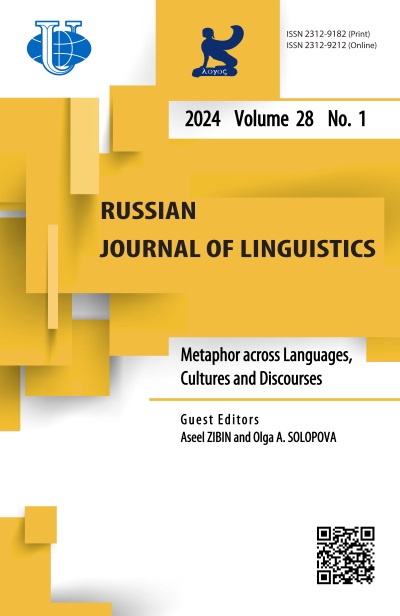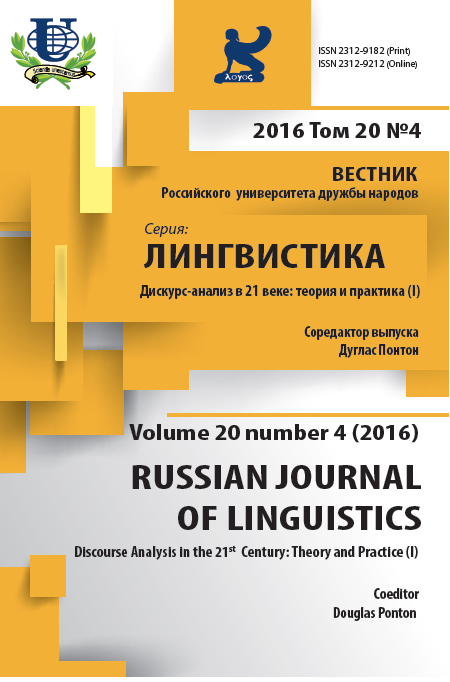Speech Genres and Discourse: Genres Study in Discourse Analysis Paradigm
- Authors: Dementyev V.V1
-
Affiliations:
- Saratov State University
- Issue: Vol 20, No 4 (2016): Discourse Analysis in the 21st Century: Theory and Practice (I)
- Pages: 103-121
- Section: Articles
- URL: https://journals.rudn.ru/linguistics/article/view/15151
- DOI: https://doi.org/10.22363/2687-0088-15151
Cite item
Full Text
Abstract
The article is devoted to the place of research on speech genres in the paradigm of discourse analysis. Focus is brought to bear on the directions of discourse analysis which have much in common with the theory of speech genre problems, categorical apparatus or set of base units, as well as using speech genre methodology to solve their problems. It is shown that the main problem, combining discourse analysis and theory of speech genres, is structuring and parameterization of speech communication, and thus - search for basic models of structuring, which organize a production of speech and its interpretation. In this regard, discourse units as well as their location with respect to the genres in the general speech space are discussed. The communicative and cognitive aspects of these units are analyzed, the chain links are constructed, which correspond to the components of communicative concepts that have clear compositional, thematic and stylistic content: the standard structure of the communicative concept is a chain of “action/act ~ process / manner ~ role / type ~ genre ~ communicative tonality”, while in most chains the main components are speech genres. Much attention is paid to the discursive classification of speech genres: genres are discussed in different types of discourse.
About the authors
Vadim V Dementyev
Saratov State University
Email: dementevvv@yandex.ru
83, Astrakhanskaya str., 410012, Saratov, Russia
References
- Abrahams, R.D. (1974). Black Talking on the Streets. Explorations in the Ethnography of Speaking. Chapter IV: Speech Acts, Events, and Situations. N.Y.: Cambridge University Press
- Adamzik, K. (1995). Textsorten - Texttypologie. Eine kommentierte Bibliographie. Münster: Nodus Publ., 1995. (Studium Sprachwissenschaft. 12)
- Austin, J.L. (1962). How to Do Things with words. Oxford: Oxford Univ. Press
- Averintsev, S.S. (1986). Istoricheskaya podvizhnost’ kategorij zhanra: opyt periodizatsii [Historical mobility of category of the genre: the experience of periodization]. Moscow: Nauka, 104-116. (In Russian)
- Balashova L.V. (2014). Russkaya metaforicheskaya sistema v razvitii: XI-XXI vv. [The Russian metaphorical system in development: 11th - 21st cent.]. Moscow: Rukopisnye pamiatniki Drevnei Rusi: Znak. (In Russian)
- Bakhtin, M.M. (1996). Problema rechevykh zhanrov [The problem of speech genres]. Moscow: Yazyki Russkoi Kul’tury, 159-206. (In Russian)
- Benveniste, E. (1979). Problemes de linguistique generale. P.: Gallimard, 1974. Vol. 1-2
- Bernstein, B. Social Class, Language and Socialization // Language and Social Context: Selected Readings. Harmondsworth: Penguin, 1979
- Bhatia, Vijay K. (2002). Applied genre analysis: a multi-perspective model // Ibérica, 4, 3-19
- Bobyreva, E. V. (2007). Religioznyi diskurs: tsennosti, zhanry, strategii (na materiale pravoslavnogo veroucheniya) [Religious discourse: values, genres, strategies (based on the Orthodox Christianity)]. Volgograd: Peremena. (In Russian)
- Bogin, G.I. (1997). Rechevoy zhanr kak sredstvo individualizatsii [Speech genres as means of individualization]. Saratov: Kolledj. (In Russian)
- Borisova, I.N. (2001). Russkiy razgovornyi dialog: struktura i dinamika [Russian colloqial dialogue: structure and dynamics]. Yekaterinburg: Ural Univ. Publ. (In Russian)
- Dementyev, V.V. (2009). Russian Anekdots of 1970s: on the Material of the Soviet Humorous Magazine “Krokodil”. Russian Journal of Communication, Vol. 2, Nos. 3/4. Special Issue: The Russian anekdot as cultural genre, discourse and performance
- Dementyev, V.V., Balashova, L.V., Stepanova N.B., Baykulova A.N. (2014). Linguistic aspect of speech genres. Journal of Language and Literature. 5( 4), 288-291
- Dementyev V.V., Balashova L.V., Stepanova N.B., Shapovalova N.G. (2016). Language - genre - creativity: linguistic aspects of the problem. Journal of Language and Literature. 7.(1), 142-145
- Dementyev, V.V. (2010). Teoriya rechevykh zhanrov [A theory of speech genres]. Moscow: Znak. (Kommunikativnye strategii kul’tury). (In Russian)
- Dementyev, V.V. (2015). Teoriya rechevykh zhanrov i aktual’nye protsessy sovremennoj rechi [The theory of speech genres and actual processes of the modern speech]. Moscow: Voprosy yazykoznaniya, 6 (7-107). (In Russian)
- Dementyev, V.V. (2016). Nekotoryye metodologicheskiye printsipy izucheniya rechezhanrovykh zaimstvovanii [Some Methodological Principles of Study on Borrowing Speech Genres]. Vestnik Rossiyskogo universiteta druzhby narodov. Seriya Lingvistika. 20 (1), 7-24. (In Russian)
- Dijk, T.A. van. (1985). Handbook of discourse analysis. V. 1-4. L.: Academic Press
- Dönninghaus, S. (2001). Sprechakt und Kommunikationsgenre. (Theoretische Aspekte der sprachlichen Interaktion). Beiträge der Europäischen Slavistischen Linguistik (PolySlav). Bd. 4. München, 69-79
- Dönninghaus, S. (2005). Die Vagheit der Sprache: Begriffsgeschichte und Funktionsbeschreibung anhand der tschechischen Wissenschaftssprache (Slavistische Studienbucher. Neue Folge). Wiesbaden: Harrassowitz
- Dolinin, K.A. (1999) Rechevye zhanry kak sredstvo organizatsii social’nogo vzaimodeystviya [Speech genres as means of organization of social interaction]. Saratov: Zhanry rechi (2), 7-13. (In Russian)
- Dubrovskaya, T.V. (2014). Sudebnyi diskurs kak kul’turnyi fenomen: natsional’no-kul’turnye osobennosti rechi sudei (na materiale russkikh, anglijskikh i avstralijskikh sudebnykh zasedaniy) [Legal discourse as a cultural phenomenon based on English, Russian and Australian court hearings]. Moscow: Voprosy yazykoznaiya (2), 76-88. (In Russian)
- Duskaeva, L.R. (2012). Dialogicheskaya priroda gazetnykh rechevykh zhanrov [Dialogical nature of the newspaper speech genres]. St. Petersburg: St. Petersburg State Univ. (In Russian)
- Dymarskiy, M.Ya. (2015). Model’ vyskazyvaniya i rechevye zhanry (na materiale kontroptativnykh infinitivnykh vyskazyvaniy [The model o statement and speech genres]. Moscow: Institut russkogo yazyka im. V.V. Vinogradova, 54-56. (In Russian)
- Fedosyuk, M.YU. (1997). Nereshennye voprosy teorii rechevyh zhanrov [Unsolved problems in the theory of speech genres]. Moscow: Voprosy yazykoznaniya (5), 102-120 (In Russian)
- Fillmore, Ch. (1976). Nyt need for a frame semantics within linguistics. Statist. Meth. Linguist. Vol. 1
- Fix U. (2008). Texte und Textsorten - sprachliche, kommunikative und kulturelle Phänomene. Berlin: Frank & Timme GmbH
- Gajda St. (1991). Gatunki wypowiedzi potocznyc. Język potoczny jako przedmiot badań językoznawczych. Z. Adamiszyn: Opole, 67-74
- Gatunki mowy (2004-2007). Gatunki mowy i ich ewolucja. Pod red. Danuty Ostaszewskiej. T. 1. Mowy piękno wielorakie. Katowice: Wydaw. Uniwersytetu Śląskiego, 2000; T. 2. Tekst a gatunek. Katowice: Wydaw. Uniwersytetu Śląskiego, 2004; T. 3. Tekst a odmiany funkcjonalne. Katowice: Wydaw. Uniwersytetu Śląskiego
- Goddard, C. & Wierzbicka, A. (1997). Discourse and Culture // Teun A. van Dijk (ed.) Discourse as Social Interaction / Discourse Studies: A Multidisciplinary Introduction. L.: Sage, Vol. 2, 231-259
- Goldin, V.E., Sirotinina, O.B. Vnutrinatsionalnye rechevye kultury i ikh vzaimodeistvie [Sub-national speech cultures and their interactions]. Saratov: Izd-vo Sarat. gos. univers. (In Russian)
- Hanks W.F. (2000). Dialogic conversions and the field of missionary discourse in Colonial Yucatan. Les Rituels du Dialogue. A. Monod Becquelin & Philippe Erikson (ed.). Nanterre: Société d’Ethnologie, 235-254
- Herring, S.C. (2007). A Faceted Classification Scheme for Computer-Mediated Discourse. Language@Internet, 4. Article 1 [Retrieved April 26, 2009]
- Itskovich, T.V. (2015). Kategorial’no-tekstovaya specifika sovremennoy pravoslavnoy propovedi [Categorical and textual specificity of modern Orthodox preaching]. Ekaterinburg: ID Azhur. (In Russian)
- Juvan, M., (2002). Literariness as a culturally based feature. In Stylistyka ХI. Opole, 9-29
- Karasik, V.I. (2002). Yazykovoj krug: lichnost’, kontsepty, diskurs [Language circle: personality, concepts, discourse]. Volgograd: Peremena. (In Russian)
- Karzenkova, E.P., Salimovskiy, V.A. (2005). K ehksplikatsii ponyatiya kommunikativnoy kategorii [To the explication of communicative category’s notion]. Perm’: Izd-vo Perm. un-ta, 98-104. (In Russian)
- Kitaygorodskaya, M.V., Rozanova, N.N. (1999). Rech’ moskvichey. Kommunikativno-kul’turologicheskiy aspekt [Speech of Muscovites. Communicative and cultural aspect]. Moscow: Russkie slovari. (In Russian)
- Kozhina, M.N. (1999). Rechevoy zhanr i rechevoy akt (nekotorye aspekty problemy) [Speech genre and speech act (some aspects of the problem)]. Zhanry rechi. No. 2. Saratov: Zhanry rechi (2), 52-61. (In Russian)
- Krasnyh, V.V. (2015). ZHanry rechi skvoz’ prizmu mnogomernosti bytiya Cheloveka govoryashchego [Speech genres through the prism of the multidimensionality of Homo Loquens]. Moscow: Zhanry rechi (1), 9-14. (In Russian)
- Lakoff, R. (2001). The Language war. Berkeley; Los Angeles; London: University of California Press
- Lakoff, R. (2006). Identity à la carte: you are what you eat. Discourse and Identity. Anna DeFina, Deborah Schiffrin and Michael Bamberg (ed.). Cambridge: Cambridge University Press, 142-165
- Manes J. (1983). Compliments: A Mirror of Cultural Values // Sociolinguistics and Language Acquisition. N. Wolfson, E. Judd (Eds.). Rowley
- Matveeva, T.V. (1995). K lingvisticheskoy teorii zhanra [By linguistic theory genre]. Kiev: Collegium (1-2). (In Russian)
- Minsky, M. (1975). A Framework for Representing Knowledge. MIT-AI Laboratory Memo 306, June. Reprinted in The Psychology of Computer Vision, P. Winston (Ed.), McGraw-Hill
- Mkrtychyan, S.V. (2015). Rechevoy zhanr: o edinitsah strukturirovaniya produkta rechevoy deyatel’nosti [Speech genre: the unit of product structuring off speech activity]. Saratov: Zhanry rechi. (In Russian)
- Mustajoki, A. (2013). Title Risks of miscommunication in various speech genres. Understanding by Communication. E. Borisova & O. Souleimanova (ed.). Cambridge Scholars Publishing. Cambridge, 33-53
- Oleshkov, M.Yu. (2012). Pedagogicheskiy diskurs [Pedagogical discourse]. Nizhni Tagil: Nizhni Tagil State Social-Pedagogical Academy. (In Russian)
- Palashevskaya, I.V. (2012). Sudebnyi diskurs: funktsii, struktura, narrativnost’ [Legal discourse: functions, structure, narrativity]. Volgograd: Volgograd State Pedagogical Univ. (In Russian)
- Peeters, B. (2009). Language and cultural values: the ethnolinguistic pathways model. Flinders University Languages Group Online Review. 4 (1), 90-117
- Pokrovskaya, E.A., Dudkina, N.V., Kudinova, E.V. (2011). Rechevye zhanry v dialoge kul’tur [Speech genres in the dialogue of cultures]. Rostov-na-Donu: Foundation. (In Russian)
- Ponomarenko, E.A. (2011). Rechevye zhanry v meditsinskom diskurse (v proizvedeniyakh russkikh pisateley-vrachey) [Speech genres in the medical discourse (in the texts of Russian doctor writers]. Simferopol’: Dombrovsky Writers’ House. (In Russian)
- Salimovskiy, V.A. (2002). Zhanry rechi v funktsional’no-stilisticheskom osveshhenii (nauchnyy akademicheskiy tekst) [Speech genres from the functional-stylistic perspective (academic scientific text)]. Perm’: Izd-vo Perm. un-ta. (In Russian)
- Searle, J.R. (1983). Intentionality: An Essay in the Philosophy of Mind. Cambridge: Cambridge University Press
- Sedov, K.F. (2016). Obshchaya i antropocentricheskaya lingvistika [General and anthropological linguistics]. Moscow: Yazyki slavyanskih cultur. (In Russian)
- Shevchenko, I.S. (2015). Koncept kommunikativnogo povedeniya i zhanr [Concept of communicative behavior and genre]. Saratov: Zhanry rechi (1), 23-24. (In Russian)
- Sheigal, E.I. (2004). Semiotika politicheskogo diskursa [Semiotics of political discourse]. Moscow: Gnozis. (In Russian)
- Sherstyanykh, I.V. (2013) Teoriya rechevyh zhanrov [The theory of speech genres]. Moscow: Flinta Nauka. (In Russian)
- Shmeleva, T.V. (1997). Model’ rechevogo zhanra [Model of speech genre]. Saratov: Kolledj (1), 88-89. (In Russian)
- Schurina, Y.V. (2016). Zhanrovoe svoeobrazie social’noj seti Instagram [Genre individuality of Instagram social net]. Saratov: Zhanry rechi (1), 156-168. (In Russian)
- Sirotinina, O.B. (1999). Nekotorye razmyshleniya po povodu terminov “rechevoj zhanr” i “ritoricheskij zhanr” [Some reflections concerning the term “speech genre” and “rhetorical genre”]. Saratov: Kolledj, 26-31. (In Russian)
- Slyshkin, G.G. (2005). Rechevoj zhanr: perspektivy konceptologicheskogo analiza [Speech genre: perspectives of conceptological analysis]. Saratov: IZ Nauka: Zhanry rechi, (4), 34-49. (In Russian)
- Small talk (2000). Small talk. J. Coupland (ed.). Harlow: Longman
- Swales, J.M. (1990). Genre Analysis: English in Academic and Research Settings. Cambridge: Cambridge University Press
- Tannen D. (2008). «We’ve Never Been Close, We’re Very Different»: Three Narrative Types in Sister Discourse. Narrative Inquiry. 18:2, 206-229
- Tannen, D. (2010). Abduction and identity in family interaction: Ventriloquizing as indirectness. Journal of Pragmatics. 42, 307-316
- Thomas, J. (1985). Cross-cultural discourse as “unequal encounter”: towards a pragmatic analysis. Applied Linguistics, 5
- Wierzbicka, A. (1983). Genry mowy // Tekst i zdanie. Zbiór studiów / Red. T. Dobrzyńska, E. Janus. Wroclaw itd.: PAN, 125-137
- Wierzbicka, A. (1991). Cross-Cultural Pragmatics: The semantics of human interaction. Berlin: Mouton de Gruyter
- Wierzbicka, A. (2006). Anglo scripts against ‘putting pressure’ on other people and their linguistic manifestations. Cliff Goddard (ed.) Ethnopragmatics: Understanding Discourse in Cultural Context. Mouton de Gruyter, 31-63
- Witosz, B. (2005). Genologia lingwistyczna. Zarys problematyki. Katowice: Wydawnictwo Uniwersytetu Śląskiego
- Wodak, R. (1996). Disorders of discourse. London and New York: Longman
- Wojtak, M. (2011). Współczesne modlitewniki w oczach językoznawcy. Studium genologiczne. Tarnów: Biblos

















